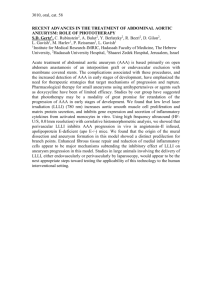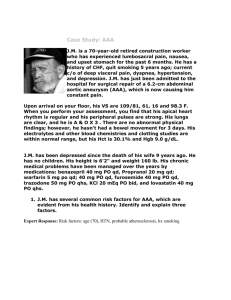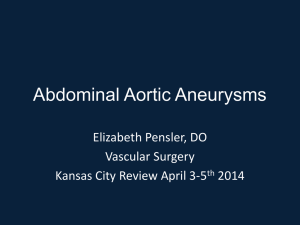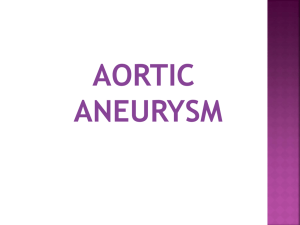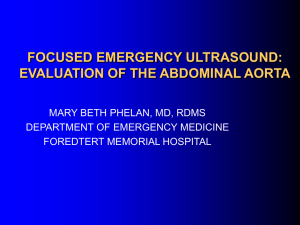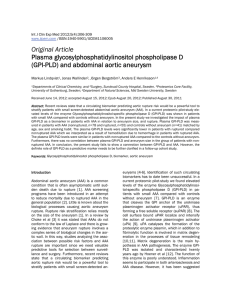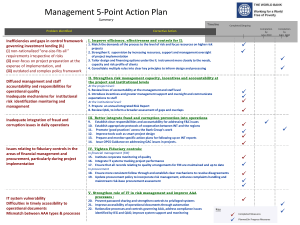ABDOMINAL AORTIC ANEURYSMS (pptx 5MB)
advertisement
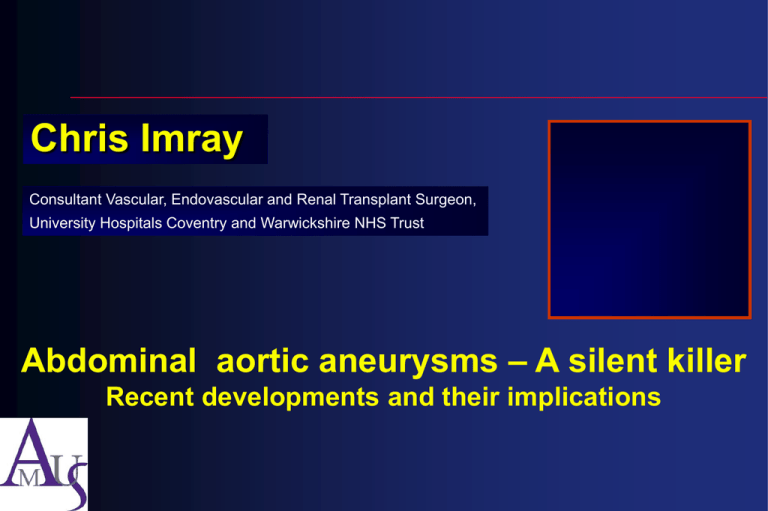
Chris Imray Consultant Vascular, Endovascular and Renal Transplant Surgeon, University Hospitals Coventry and Warwickshire NHS Trust Abdominal aortic aneurysms – A silent killer Recent developments and their implications Aims The brief is for me was to present to you on - aortic aneurysm, morbidity and mortality - how modern treatments might influence these - the implications of a national screening programme producing an overall improvement in mortality - the possibility of non-disclosure of the condition in its early stages to an insurance company Deaths due to cancer and CVD by decade Aortic aneurysm, morbidity and mortality • An abdominal aortic aneurysm (AAA) is a permanent dilation of the abdominal aorta greater than 3 cm in diameter • The natural course is one of progressive enlargement, and maximum aortic diameter is the strongest predictor of aneurysm rupture Aortic aneurysm, morbidity and mortality • The reported incidence of AAA is 4.9-9.9% and mortality after rupture exceeds 80%, accounting for 8000 deaths annually in the United Kingdom • Elective surgical repair has an operative mortality of 1-5% in the best centres, and several countries have implemented population screening programmes to reduce aneurysm related mortality AAA ESSENTIALS Definition • Diameter of the aorta 1.5 times (3.0cm) greater than normal. • Most are infrarenal, and a significant number extend down into one or both iliac arteries. Incidence and Mortality in the UK Around 6,000 deaths each year in England and Wales from ruptured AAA Deaths from AAA account for around 2% of all deaths in men aged 65 and over Around 4% of men aged between 65 and 74 in England have an AAA (approx. 80,000 men) Incidence in women much lower (1/3-1/4) Vascular disease (including death from ruptured AAA) accounts for 40% of UK deaths Diagnosis • • • • History Examination Ultrasound CT / MRA Natural history of the disease La Place’s Law Annual rupture rates of abdominal aortic aneurysms according to size (based on pooled available data). Thompson M M , Bell P R F BMJ 2000;320:1193-1196 ©2000 by British Medical Journal Publishing Group AAA Surgery • Performed because of natural history of AAA expansion and risk of death • There is also morbidity due to arterial thromboembolism to legs • Therefore surgery is recommended in AAA over 5.5 cm • 2002 study showed no benefit to surgery on small (4-5.5) aneurysms History of treatment options • • • • Ligation Coil Wrap Graft • Inlay graft • Endoluminal Modern treatments REPAIR OPTIONS Open Surgery • • • Requires large abdominal or flank incision Retroperitoneal dissection and exclusion of the aneurysm by clamping the aorta Removal of the affected aorta and replacement with surgical graft Average hospital stay: 7-14 days Average recovery time: 1-3 months 3-6% mortality REPAIR OPTIONS Endovascular Surgery • • Requires two small incisions in the groin area. An endovascular graft is inserted through the femoral artery via a catheter and deployed inside the lumen, relining the aorta. Average hospital stay: 2-3 days Average recovery time: 1-2 weeks 1% mortality Fitness for surgery VO2 Max and anaerobic threshold • VO2 Max: Maximum uptake of oxygen (ml/kg/min). • AT: Level of physical performance at which lactic acid production exceeds clearance by the liver and muscle enzyme systems. Cardio pulmonary exercise testing and surgical outcome • A minimum aerobic (AT) capacity is required to survive the stress of a major operation • Anaerobic threshold < 11ml/kg/min is associated with poor outcome from surgery Deaths AT< 11 Deaths AT>11 Risk Ratio 18%(10/55) 0.8%(1/32) 24(3.1-183) Old et al Chest 1993 Mortality (%) at one month following elective AAA surgery 60 Mortality at one month % 50 40 95% confide 95% confide 30 Mortality 20 10 0 6.7 7.5 8.3 9 9.7 10.5 11.3 12 12.7 13.5 14.3 15 15.7 16.5 17.3 Anaerobic threshold mls O2/kg/min Carlisle and Swart BJS 2007 18 18.7 19.5 20.3 Pre-operative Cardiopulmonary Exercise Test stratification in Elective Abdominal Aortic Aneurysm Surgery reduces length of inpatient stay and costs. Data on 237 consecutive patients considered for elective (open/EVAR) AAA repair between November 2007-July 2011 were compared with a control group of 128 consecutive unselected elective AAA repair patients. CPEX-failed patients suffered higher mortality than the CPEXpass cohort (21.6% vs 8.9%; p<0.05) although aneurysmrelated mortality was equivalent (5.4% vs 2.2%; p=NS). Selected CPEX-fail patients were offered EVAR. CPEX-pass open AAA patients required a significantly shorter ITU stay (3.5 vs 12.9 days; p<0.01) and total length of inpatient stay (12.8 VS 16.5 days; p<0.05) than unselected elective open AAA patients between 2003-2007. World Health Organization —Principles of Screening • The condition should be an important health problem. • There should be a treatment for the condition. • Facilities for diagnosis and treatment should be available. • There should be a latent stage of the disease. • There should be a test or examination for the condition. • The test should be acceptable to the population. • The natural history of the disease should be adequately understood. • There should be an agreed policy on who to treat. • The total cost of finding a case should be economically balanced in relation to medical expenditure as a whole. Advantages vs Disadvantages • False positives. • Screening involves cost and use of medical resources on a majority of people who do not need treatment. • Adverse effects of screening procedure (e.g. stress and anxiety, discomfort, radiation exposure, chemical exposure). • Unnecessary investigation and treatment of false positive results. • Stress and anxiety caused by prolonging knowledge of an illness without any improvement in outcome. MASS Trial Analysis of the 10-year Multicentre Aneurysm Screening Study (MASS) data shows that the NHS AAA Screening Programme will prevent significant numbers of AAA ruptures and AAA deaths. It also proves that the number of lives saved will greatly outweigh the number of post-elective surgery deaths. The following figures use the 10-year MASS data and assume an 80% attendance for screening and a 5% post-elective surgery mortality: 240 men need to be invited (192 scanned) to save one AAA death over 10 years Thompson S G et al. BMJ 2009;338:bmj.b2307 Cumulative deaths related to abdominal aortic aneurysm, by time since randomisation. Thompson S G et al. BMJ 2009;338:bmj.b2307 ©2009 by British Medical Journal Publishing Group Impact of screening The screening process All men living in an area covered by the screening programme are automatically invited for screening in the year they turn 65. Men who are older than 65, and who have not previously been screened or treated for an abdominal aortic aneurysm, can opt-in through self-referral direct to the screening programme. Men receive an invitation leaflet with an appointment time three weeks in advance. If the man accepts the invitation an ultrasound scan of the abdomen is carried out and the aortic diameter measured. Results are provided verbally immediately after the scan and in the post shortly afterwards. Non-disclosure Rupture >80% mortality AAA Summary 1. Aortic aneurysm, morbidity and mortality 2. Modern treatment might influence these 3. National screening programme producing an overall improvement in mortality 4. Possibility of non-disclosure to an insurance company. Thank you
